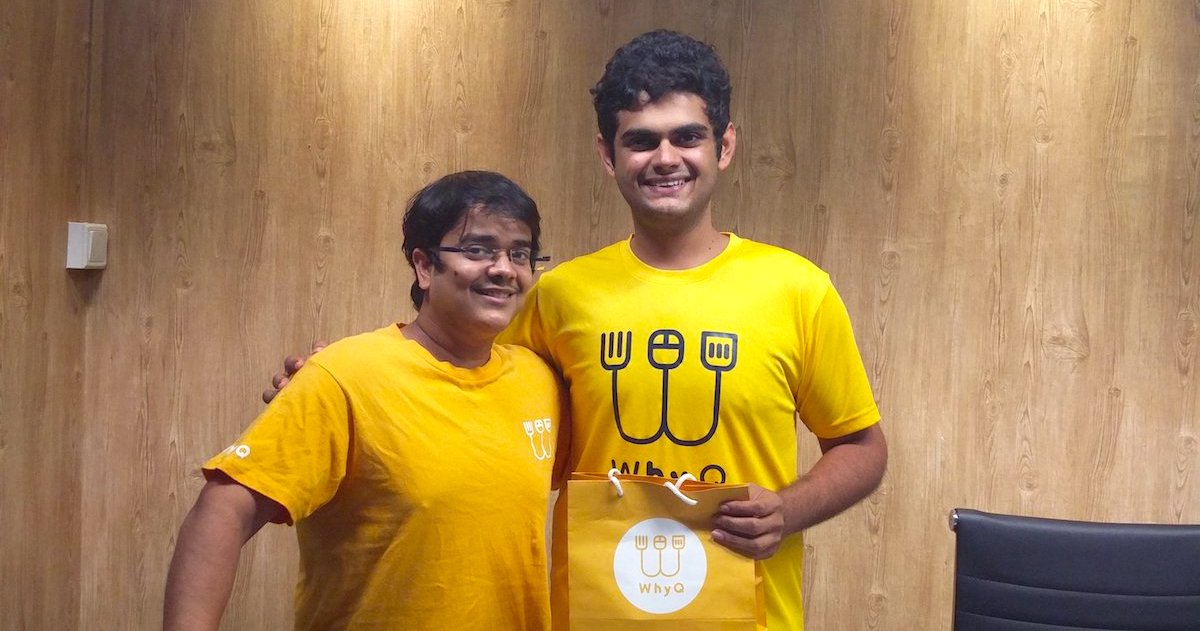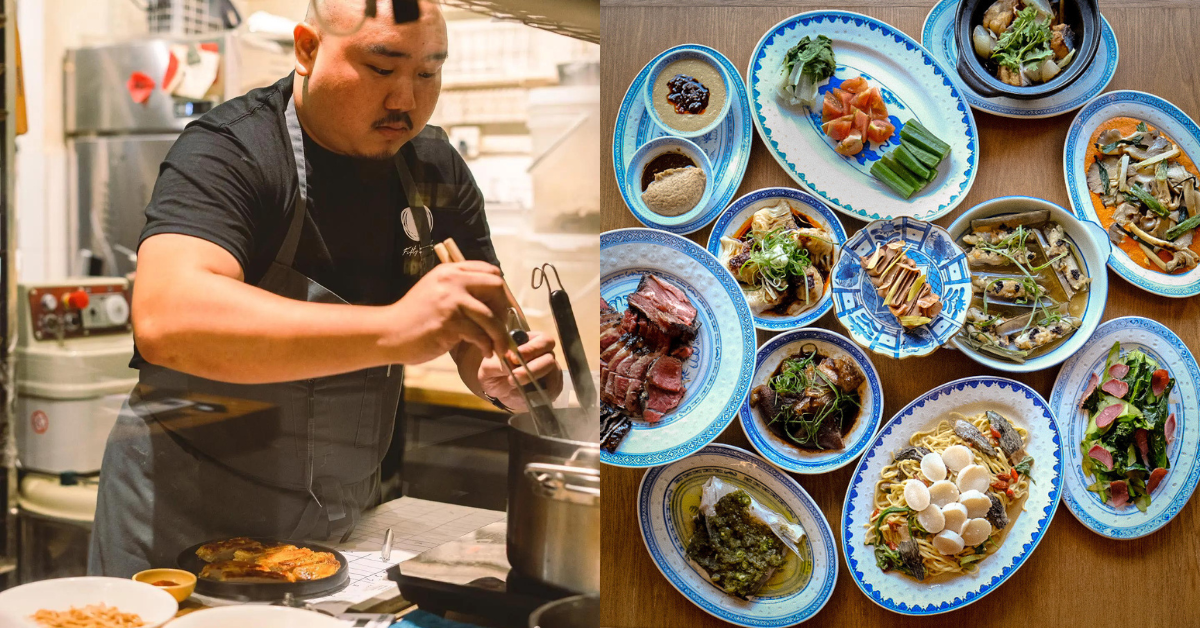Rishabh Singhvi and Varun Saraf moved to Singapore from India in 2008.
The 27-year-olds were fellow coursemates and roommates in Singapore Management University (SMU) back then, both pursuing a degree in Information Systems in Finance.
Upon graduation in 2012, they landed corporate banking jobs in the busy Central Business District (CBD).
Lunchtime at the CBD was often a rather exasperating experience – they faced snaking long queues, and they found it hard to find feasible delivery options on a daily basis.
That’s when they decided to make it their goal to help those who face the same problem to find affordable yet tasty options for their daily meals.
“We love hawker food in the [CBD] area and this is when we realised the potential for a low-cost model of food delivery from hawker centres,” said Rishabh.
And that’s exactly how WhyQ came about: why queue when they can bring Singapore’s favourite hawker food to you?
Spreading The Love For Hawker Food
Rishabh and Varun are both self-professed hawker foodies.
Because of their strong passion for Singapore’s hawker culture, they wanted WhyQ to be a food delivery service that focuses on bringing local hawker fare to their customers – at a significantly low delivery fee of $1.50 per meal, and with no minimum order.
Their goal is to provide busy individuals an opportunity to enjoy the unique cuisine Singapore has to offer – conveniently, affordably, and quickly.
In February 2014, while juggling their banking jobs, they worked part-time on developing WhyQ; and as part of their R&D efforts, they even conducted a closed beta in the Changi Business Park area.

Two years later, they took the plunge to quit their cushy banking jobs in August 2016 to work on WhyQ full-time, officially launching the service in February this year.
Rishabh admitted that their lack of business knowledge and experience made for a “difficult” transition of running their own startup.
“We had limited experience in starting a business from scratch, and it was, and will, continue to be a steep learning curve. We are still learning the financial, tech, operational, legal and strategic aspects of the business,” he added.
The duo “invested a chunk of our [their] personal savings” into the business venture, which helped them bootstrap till end of 2016. Thereafter, they began to seek for funding and have since received angel investment.
Right now, the startup is on the path to break even.
Starting From Scratch

According to Rishabh, the response at launch was overwhelming. The low delivery fee of $1.50 per meal, the offering of promo codes to new users, as well as referral codes has helped them grow their user base.
In fact, they actually had to implement “maximum order limits” to contain the orders so that they would be able to fulfil them and not disappoint any customers.
When asked to justify their low delivery charges – compared to the usual $3 fee – Rishabh said that they wanted to ensure that each person can order food for themselves, without worrying about meeting a minimum order amount by finding friends to order with.
Additionally, since hawker food is already inexpensive, he intends to keep the pricing low even if it is being delivered.
“We are now covering majority of the CBD area, delivering from over seven hawker centres. We have a customer base of over 4,000 today and deliver over 300 to 350 orders per day,” said Rishabh.
It wasn’t easy getting there though.
Starting out, Rishabh confessed that it was hard for them to “break the ice” with the hawkers, as neither of them spoke vernacular languages. As such, they had to tap their delivery men as “ambassadors” to engage hawkers who are not conversant in English.
Additionally, hawkers were initially not too keen on employing technology on their side to fulfil orders.
“However, we see that changing now as we are piloting wireless printers with some hawkers,” said Rishabh.
On A Different Playing Field
When asked about their business strategy to compete with other food delivery companies such as Deliveroo and Foodpanda, Rishabh claims that they are adopting different business models to begin with.
“WhyQ focuses on the niche of hawker food and delivers affordable hawker food from nearby hawker centres. Our model is an aggregated batch-based model, different from an on-demand model that other food delivery companies use,” said Rishabh.
“We deliver in batches at fixed time slots to a collection point – which is usually the reception area. Hawker food is inexpensive, and our mission is to keep it that way even while delivering it. Our economies of scale model ensures that we can optimise our delivery process, hire fewer resources and deliver to multiple customers together, which in turn helps us remove minimum orders and keep delivery costs low.”
In other words, unlike on-demand delivery services, WhyQ pools their orders from each hawker centre. These include Tian Tian Hainanese Chicken Rice at Maxwell Food Centre and Michelin-starred Liao Fan Hong Kong Soya Sauce Chicken Rice & Noodle at Chinatown Complex.
WhyQ’s 20-men delivery team collects the food just before lunch, and they will then label each order according to the destination. All deliverers then meet up to sort the food packs based on delivery locations, before heading out again to various locations in the CBD to deliver the food.
“As we operate using a hyperlocal model, distances are short and our delivery partners either deliver on foot with the help of trolleys, or on bicycles,” said Rishabh.
Popular office buildings, such as Capital Tower and Marina Bay Financial Centre, get three runs in around an hour. Otherwise, most locations have two delivery timings.

Besides bringing convenience to the customers, WhyQ also aims to bring an additional stream of revenue to the hawker stalls. Partnerships with hawkers vary – some are charged a commission ranging from 5 to 15 per cent, while others promise “heartier than normal” meals.
“Before we tie-up with our hawker partners, we discuss what each one of them is comfortable with. This helps us keep our commissions low so we can reach out to a wide range of hawker stalls,” said Rishabh.
Future Plans

Presently, WhyQ is a web-only application but it’s working with local company Skylark to develop a mobile app; and it is slated to launch by mid-year.
WhyQ also currently operates strictly during lunchtime hour at the CBD, but the startup has plans to expand to other business districts such as Changi Business Park and one-north. It is also eyeing residential areas as well as educational institutions in Singapore.
Besides opening up to other areas, Rishabh also said that they are exploring the options of offering their services for dinner and weekend deliveries too.
Additionally, the startup has also recently started a weekly #HawkersOfSG series on their Facebook page, which helps users get an insight into the unsung lives of hawkers.
When asked to impart some advice to fellow entrepreneurs, Rishabh said that his business mantra is inspired by Jeff Bezos, CEO of Amazon – “If you build a great experience, customers tell each other about that. Word of mouth is very powerful.”
“Entrepreneurs should focus on the value-add to customers and on the overall customer experience; because if you get this right, the product will sell itself.”
Featured Image Credit: WhyQ








